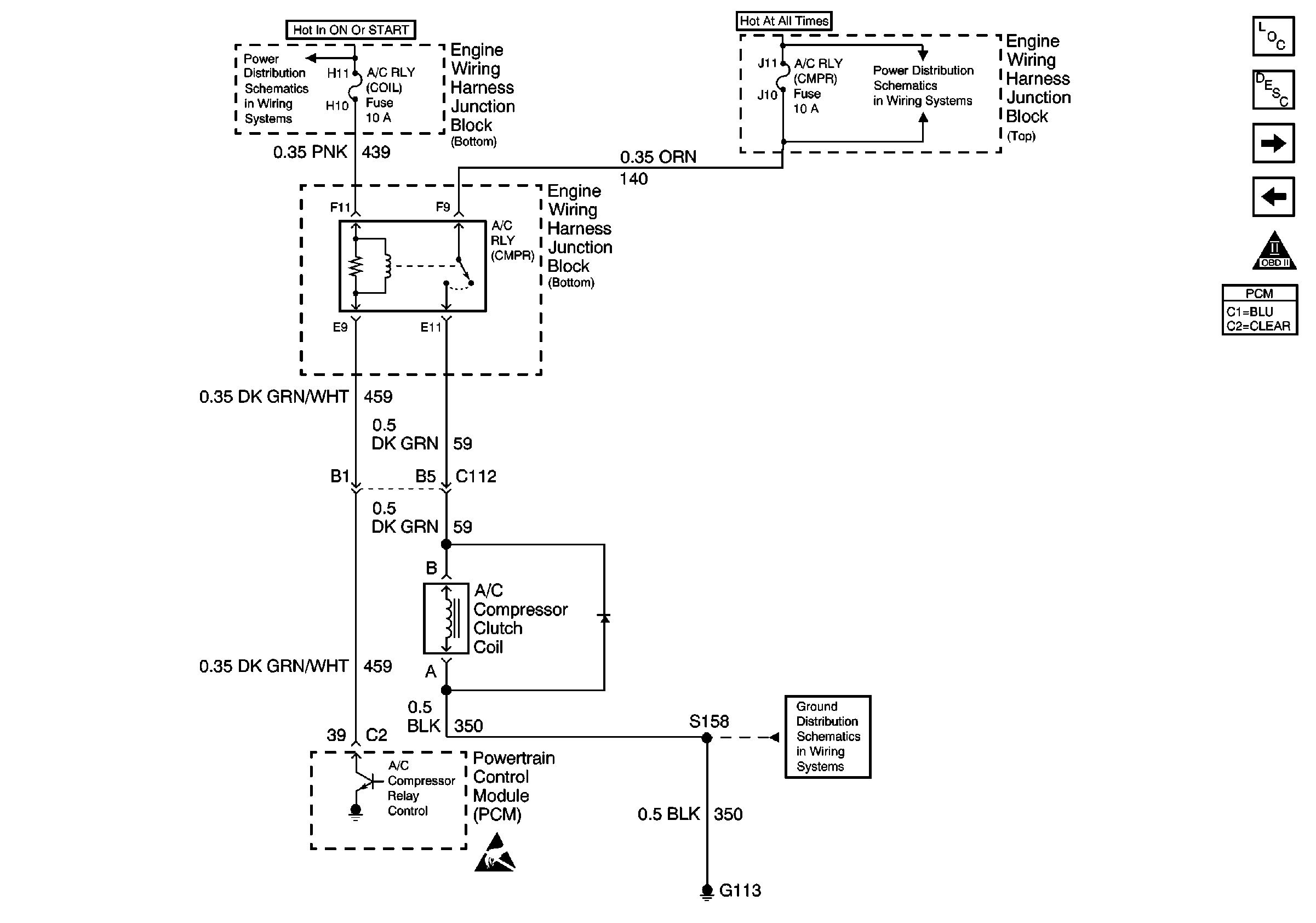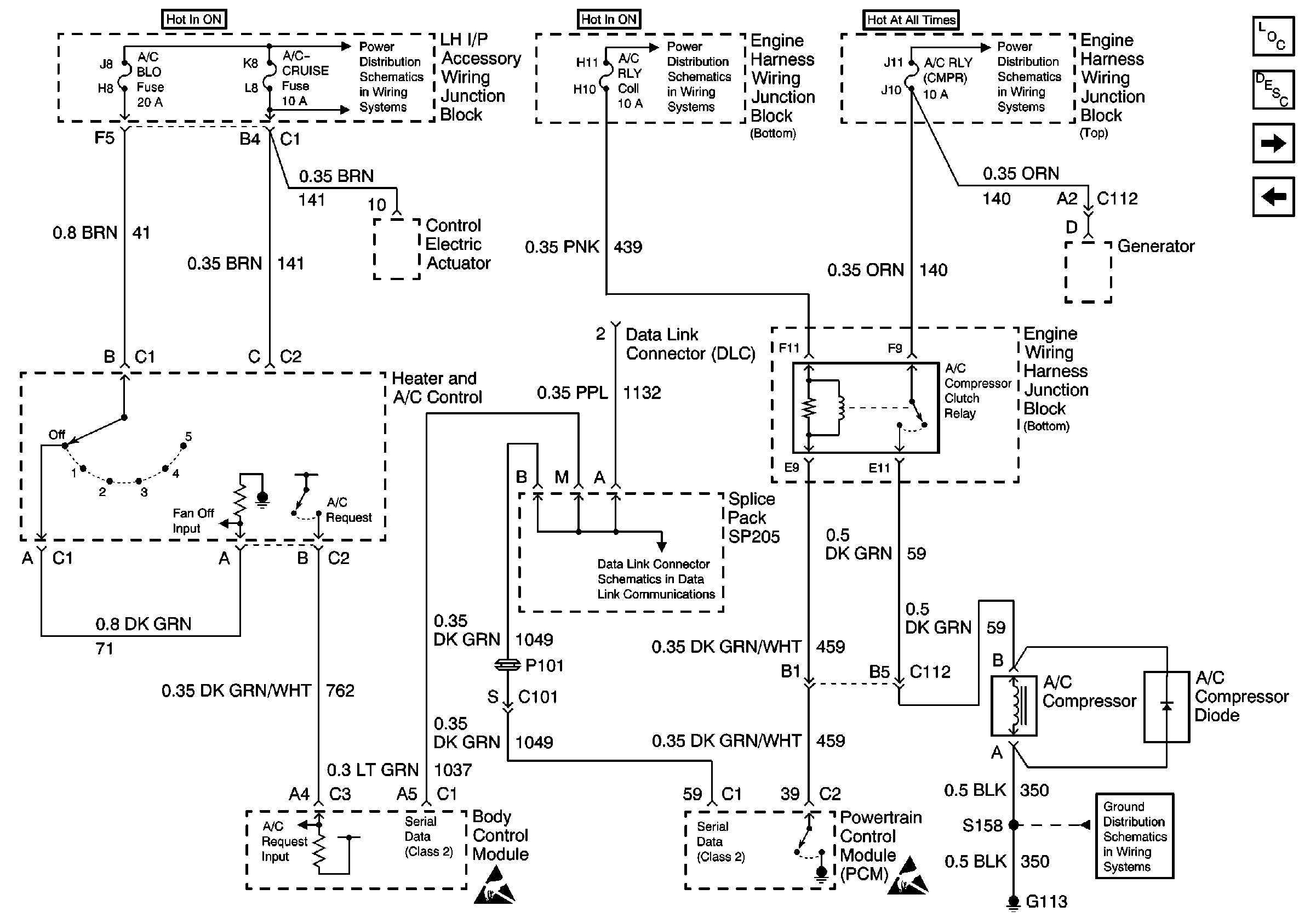Refer to Engine Controls Schematic
A/C Compressor Controls

, and to HVAC Schematic

in HVAC.
Circuit Description
When A/C is selected through the HVAC controller, a 12 volt signal is supplied to the body control module (BCM). The BCM in turn signals the PCM through the Class 2 serial data circuit that A/C has been requested. The PCM then determines if conditions suitable for A/C operation are present. If the PCM determines that the engine operating conditions are within the acceptable ranges, the PCM will enable the A/C relay. The PCM provides a ground path for the A/C relay coil. This action closes that A/C compressor relay contacts and B+ voltage is supplied to the compressor clutch coil. The compressor clutch coil has its own ground path.
The PCM will enable the A/C unless any of the following conditions are met:
| • | The throttle position is more than 96 percent . |
| • | The A/C pressure is more than 472 psi (4.9 volts) or less than 9 psi (0.1 volt) as determined by the A/C pressure sensor. |
| • | The ignition voltage is less than 10.0 volts. |
| • | The engine is speed more than 4700 RPM. |
| • | The engine coolant temperature (ECT) is more than 124°C (255°F). |
| • | The intake air temperature (IAT) is less than 5°C (41°F). |
| • | A Class II communication error occurs between the HVAC controller and the PCM. |
Diagnostic Aids
Inspect for the following conditions:
Many situations may lead to an intermittent condition. Perform each inspection or test as directed.
Important: : Remove any debris from the connector surfaces before servicing a component. Inspect the connector gaskets when diagnosing or replacing a component. Ensure that the gaskets are installed correctly. The gaskets prevent contaminate intrusion.
| • | Loose terminal connection |
| - | Use a corresponding mating terminal to test for proper tension. Refer to Testing for Intermittent Conditions and Poor Connections , and to Connector Repairs in Wiring Systems for diagnosis and repair. |
| - | Inspect the harness connectors for backed out terminals, improper mating, broken locks, improperly formed or damaged terminals, and faulty terminal to wire connection. Refer to Testing for Intermittent Conditions and Poor Connections , and to Connector Repairs in Wiring Systems for diagnosis and repair. |
| • | Damaged harness--Inspect the wiring harness for damage. If the harness inspection does not reveal a problem, observe the display on the scan tool while moving connectors and wiring harnesses related to the sensor. A change in the scan tool display may indicate the location of the fault. Refer to Wiring Repairs in Wiring Systems for diagnosis and repair. |
| • | Inspect the powertrain control module (PCM) and the engine grounds for clean and secure connections. Refer to Wiring Repairs in Wiring Systems for diagnosis and repair. |
If the condition is determined to be intermittent, reviewing the Snapshot or Freeze Frame/Failure Records may be useful in determining when the DTC or condition was identified.
Test Description
The numbers below refers to the step number on the diagnostic table:
Step | Action | Values | Yes | No | ||||||||
|---|---|---|---|---|---|---|---|---|---|---|---|---|
1 | Did you perform the Powertrain On-Board Diagnostic (OBD) System Check? | -- | ||||||||||
2 | Are any PCM, BCM, or UXXXX DTCs stored? | -- | Diagnose the applicable DTCs | |||||||||
3 |
Important: : The following conditions must be met before continuing with this step:
Does the A/C clutch engage? | -- | ||||||||||
4 |
Is the A/C clutch engaged? | -- | Refer to Diagnostic Aids | |||||||||
5 |
Does the A/C Request display YES? | -- | ||||||||||
Observe the A/C pressure sensor display on the scan tool. Is the A/C pressure sensor voltage within the specified range? | 0.1 - 4.9 V | Go to Cooling Insufficient - Air Conditioning (A/C) System in HVAC | ||||||||||
7 | Use the J 39500-B refrigerant recovery, recycling, and recharging (ACR4) to monitor the high side refrigerant pressure. Is high side refrigerant pressure within the specified range? | 9 - 472 psi | Go to Cooling Insufficient - Air Conditioning (A/C) System in HVAC | Go to DTC P0530 Air Conditioning (A/C) Refrigerant Pressure Sensor Circuit | ||||||||
8 | Inspect the A/C clutch fuse. Is the A/C clutch fuse open? | -- | ||||||||||
9 |
Did you find and correct the condition? | -- | ||||||||||
10 |
Is the A/C clutch engaged? | -- | ||||||||||
11 | Test for the following circuit conditions:
Did you find and correct the condition? | -- | ||||||||||
12 | Test for poor terminal connections in the A/C relay in the underhood accessory wiring block. Refer to Testing for Intermittent Conditions and Poor Connections and to Wiring Repairs in Wiring Systems. Did you find and correct the condition? | -- | ||||||||||
13 |
Does the A/C clutch engage? | -- | ||||||||||
14 | Disconnect the A/C clutch connector. Is the A/C clutch engaged? | -- | ||||||||||
15 | Replace the A/C clutch. Refer to Compressor Clutch Plate and Hub Assembly Removal in HVAC. Did you complete the replacement? | -- | -- | |||||||||
16 | Replace the A/C relay. Did you complete the replacement? | -- | -- | |||||||||
17 | Locate and repair the short to voltage in the B+ feed circuit to the A/C clutch. Refer to Wiring Repairs in Wiring Systems. Did you complete the repair? | -- | -- | |||||||||
18 |
Important: : The following conditions must be met before continuing with this step:
Does the A/C clutch engage and disengage? | -- | System OK |
